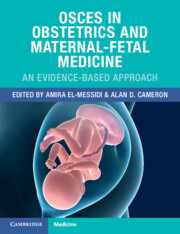Book contents
- OSCEs in Obstetrics and Maternal-Fetal Medicine
- OSCEs in Obstetrics and Maternal-Fetal Medicine
- Copyright page
- Dedication
- Contents
- Preface
- Acknowledgments
- List of Abbreviations
- Contributors
- Section 1 Obstetric Aspects of Antenatal Care
- Chapter 1 Routine Prenatal Care
- Chapter 2 Advanced Maternal Age
- Chapter 3 Teenage Pregnancy
- Chapter 4 Hyperemesis Gravidarum
- Chapter 5 Prenatal Genetic Screening
- Chapter 6 Obesity in Pregnancy
- Chapter 7 Preterm Labor
- Chapter 8 Cervical Insufficiency
- Chapter 9 Fetal Growth Restriction
- Chapter 10 Alloimmunization
- Chapter 11 Dichorionic Twin Pregnancy
- Chapter 12 Monochorionic Twin Pregnancy
- Chapter 13 Prenatal Care of Fetal Congenital Anomalies
- Chapter 14 Intrauterine Fetal Death
- Section 2 Labor and Delivery
- Section 3 Placental Complications
- Section 4 Neurological Disorders in Pregnancy
- Section 5 Psychiatric Disorders in Pregnancy
- Section 6 Cardiopulmonary Conditions in Pregnancy
- Section 7 Hepato-Renal and Gastrointestinal Conditions in Pregnancy
- Section 8 Connective Tissue Disorders in Pregnancy
- Section 9 Hematologic Conditions in Pregnancy
- Section 10 Endocrine Disorders in Pregnancy
- Section 11 Infectious Conditions in Pregnancy
- Section 12 Malignant Conditions in Pregnancy
- Section 13 Miscellaneous Conditions
- Index
- References
Chapter 1 - Routine Prenatal Care
from Section 1 - Obstetric Aspects of Antenatal Care
Published online by Cambridge University Press: 23 February 2023
- OSCEs in Obstetrics and Maternal-Fetal Medicine
- OSCEs in Obstetrics and Maternal-Fetal Medicine
- Copyright page
- Dedication
- Contents
- Preface
- Acknowledgments
- List of Abbreviations
- Contributors
- Section 1 Obstetric Aspects of Antenatal Care
- Chapter 1 Routine Prenatal Care
- Chapter 2 Advanced Maternal Age
- Chapter 3 Teenage Pregnancy
- Chapter 4 Hyperemesis Gravidarum
- Chapter 5 Prenatal Genetic Screening
- Chapter 6 Obesity in Pregnancy
- Chapter 7 Preterm Labor
- Chapter 8 Cervical Insufficiency
- Chapter 9 Fetal Growth Restriction
- Chapter 10 Alloimmunization
- Chapter 11 Dichorionic Twin Pregnancy
- Chapter 12 Monochorionic Twin Pregnancy
- Chapter 13 Prenatal Care of Fetal Congenital Anomalies
- Chapter 14 Intrauterine Fetal Death
- Section 2 Labor and Delivery
- Section 3 Placental Complications
- Section 4 Neurological Disorders in Pregnancy
- Section 5 Psychiatric Disorders in Pregnancy
- Section 6 Cardiopulmonary Conditions in Pregnancy
- Section 7 Hepato-Renal and Gastrointestinal Conditions in Pregnancy
- Section 8 Connective Tissue Disorders in Pregnancy
- Section 9 Hematologic Conditions in Pregnancy
- Section 10 Endocrine Disorders in Pregnancy
- Section 11 Infectious Conditions in Pregnancy
- Section 12 Malignant Conditions in Pregnancy
- Section 13 Miscellaneous Conditions
- Index
- References
Summary
A 27-year-old primigravida at 11+1 weeks’ gestation by menstrual dating presents for her first visit for routine prenatal care, accompanied by her husband. While discussing the comprehensive medical history with you before you meet the couple, your obstetric trainee mentions that the patient is allergic to penicillin.
Keywords
- Type
- Chapter
- Information
- OSCEs in Obstetrics and Maternal-Fetal MedicineAn Evidence-Based Approach, pp. 3 - 21Publisher: Cambridge University PressPrint publication year: 2023

